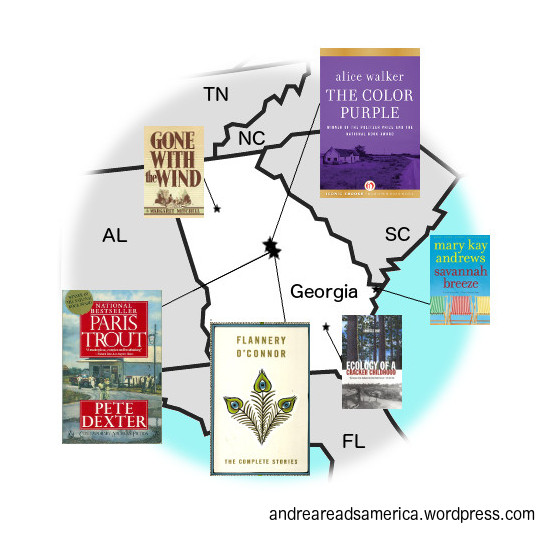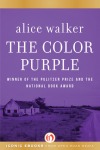
I have arrived in my home state on my US reading tour. Georgia. Where there is no way I can narrow the greats to only three books, and where as you can see by the map, I have cheated. I don’t know what it is about Southern literature, and why it has its own subgenre — Southern Gothic — but there is something about books entrenched in the deep South that appeals to me. Much of Southern literature is dark, with colorful and backwards characters, and there are undercurrents, always undercurrents, of hypocrisy, moral twisting, and a lack of self-awareness. Of masks of shoulds, and supposed-to-dos, and pretending for the sake of appearances.
But those things are human, not just Southern. Maybe I am fascinated because the American South is my home, and its history is both rich and mournful. Slavery blended African and New World, without the consent of the Africans who were brought here. It bred tensions that exist today, a pushing, pulling, and blending of cultures and cuisines and dialects, leaving contradictory, paradoxical relations between races, and endless struggles around social structure, wealth, and status. But there’s also the sullen heat, oppressive humidity, and the perfect soil — and perfect climate — for cotton, which built an economic powerhouse on the backs of slaves: an economic structure that collapsed with the abolition of slavery, leaving the proud whites poor, and the freed slaves poorer.
At any rate. Before I get to my three official picks, I want to acknowledge my cheats. Any Georgia book list is not complete without Gone With The Wind. I’ve read Mitchell’s masterpiece multiple times, and it has made me understand my home state in a way that no history class ever could. Since Gone With The Wind is always on every Georgia book list, I don’t feel it needs yet another hoorah here, so I’ve decided not to highlight it in my three picks. I couldn’t bear to not mention it at all, though, because it really is one of the best books I’ve read that truly captures the essence of a place. Likewise, Ecology of a Cracker Childhood is a raw, honest, must-read memoir written by Janisse Ray, who grew up wild and isolated in a rural Georgia junkyard, dirt poor and daughter of fundamentalist Christians.
Because I’m from the coast of Georgia, I can’t go without mentioning favorite beach reads set in my home town of Tybee Island, the beach Savannah residents flock to on summer weekends, and that seems to be gaining popularity as a tourist destination as well. For a break from Southern Gothic, and for fast, fun, and funny reading, I adore Mary Kay Andrew’s Savannah Breeze series. And finally, the ultimate cheat, who doesn’t make an appearance on the map (due to space), is Carson McCullers, with her brilliant Ballad of the Sad Café (which features a hunchback, small town gatherings on the store porch, and a fist-fighting female café owner) and The Heart Is a Lonely Hunter, which I am currently reading (and devouring).
Are you still there? If so, awesome! Now that my cheats are out of the way, let’s get on to my three picks for Georgia 🙂
 Novel: The Color Purple
Novel: The Color Purple
Author: Alice Walker, born 1944 in Eatonton, GA
Setting: 1930s rural Georgia
Categories: African American Fiction, Literary fiction, Pulitzer, National Book Award
The Color Purple by Alice Walker is one of the finest novels I have ever read. Walker was born in Eatonton, Georgia, where I spent much of my childhood catching yellow-bellies in the creek, digging potatoes with my Grandaddy, and shucking corn with my Nannie. Walker’s novel is set before my time, but she captures the feel of middle Georgia beautifully.
The marvel of The Color Purple, aside from its brilliantly written dialogue, authenticity, warmth, and spiritual truths, is that Celie, the main character, in the face of a devastating life, somehow manages to find resilience, humor, intimacy, and even joy. She is confronted continually with a world that beats her down, as she writes to her sister here about her husband:
He laugh. Who you think you is? he say. You can’t curse nobody. Look at you. You black, you pore, you ugly, you a woman. Goddam, he say, you nothing at all.
After a childhood with a father who rapes her, and after being married off to a husband who abuses her, Celie would have every reason to believe a statement like the above. But she doesn’t buy into it. She doesn’t fight it, she doesn’t become an angry, raging woman. Instead, from a life that brutalizes her, she gets tired of it all, says Screw it, and moves in her own direction.
Miss Celie, You better hush. God might hear you.
Let ‘im hear me, I say. If he ever listened to poor colored women the world would be a different place, I can tell you.
What I love about The Color Purple is that despite the world’s endless battering, despite the abuse from the men in her life, despite the loss of a sister and of a lover, Celie finds a strength inside her. She finds a direction, and she finds a strength.
Well, I say, we all have to start somewhere if us to do better, and our own self is what us have to hand.
She finds a strength in part because she finds love: love from another woman, love for a God who is not a white man with a beard but who is in trees and fields and the color purple, love for her lost sister whom she pours her heart out to in the letters that are this novel. With all that love, she finds herself, and she finds herself worthy.
For further reading about Alice Walker and other Southern women authors, please see Reading Southern Women.
 Book: The Complete Stories
Book: The Complete Stories
Author: Flannery O’Connor, born 1925 in Savannah, GA
Setting: 1940s rural Georgia
Categories: Southern Gothic, Short Stories
Grotesque. Sharp. Funny. Moral.
Dry. Smart. Twisted. Poignant.
Charming.
Flannery O’Connor’s short stories make me think of a mash-up of Patsy Cline’s country music and David Lynch’s Twin Peaks. O’Connor’s settings — with the heat, humidity, red clay, drawling dialect, racial tension, and moral righteousness — take you deep into small towns and back woods of central Georgia, and the stories are bizarre, populated with characters of the deep South whose convoluted minds O’Connor grants us entreé to.
O’Connor’s writing is tight, with every metaphor, every descriptor, contributing to the mood of the story:
She leaned a little closer and got a whiff of him that was like putting her nose under a buzzard’s wing.
Her stories are cunning. They are both alarming and witty as they examine deep truths and hypocrisies of Southern culture — outward appearances that mask judgement and racism; the struggles with Satan and rapture, Heaven and hell, class and color; and my favorite aspect, the poignant yet funny inner worlds of of her characters:
He had written a note and pinned it in his pocket. IF FOUND DEAD SHIP EXPRESS COLLECT TO COLEMAN PARRUM, CORINTH, GEORGIA.
Her characters make the stories, and it is impossible to walk away from an O’Connor story without marveling not only at her sharp wit and even sharper intelligence, but also her humility in the face of her genuine struggles with her faith in God and Church.
For further reading about Flannery O’Connor, please see Flannery, My Fire.
 Novel: Paris Trout
Novel: Paris Trout
Author: Pete Dexter, born 1943, raised in Milledgeville, GA
Setting: 1940s small-town Georgia
Category: Literary Fiction, National Book Award
Set in a liquor-dry, small fictitious town in Georgia, Paris Trout is a vivid account of a stubborn white man, Paris Trout, who is driven by a convoluted set of principles that allow him to abuse his wife because she belongs to him as a husband, and to kill a black girl and a black woman because they happen to be in the same house as a black man who owes Paris Trout money.
Written in a series of chapters titled for different characters, this book is a page turner. The plot is paced like a runaway train, and you can’t look away from the wreck you know will happen. There were portions that were exceedingly violent, portions that made me want to quit the book. But as soon as I was ready to put it down in disgust, the chapter would end and a new character voice would begin.
Paris Trout won the 1988 National Book Award, and I can see why. Though the setting is clearly Georgia, with its red clay, moonshine, and Southern sensibilities, the story is universal. Paris Trout is white and comes from a solid, respected family. He is an important man in the county. His social station carries more weight than the crimes he commits. As such, his story plays into one of the more potent themes that runs throughout the stories of the characters: appearances.
‘I didn’t have to make a living up there. I didn’t have people watching me.’
She closed her eyes as if she could not stand to see him. ‘What is left for them to see, Carl?’ she said. ‘You were the best Boy Scout in the world when you were eleven years old, and somehow that has obligated you to be the best Boy Scout forever.’
Paris Trout takes a fascinating look at appearances: how people cultivate them, how color dictates them, and how absolutely devastating it can be when the appearance the world sees — or chooses to see — is out of sync with the truth of a person.
The way he’s crazy isn’t that far off center so most of the time he seems like anyone else… Ordinary people might consider things in the abstract, but bad intentions aren’t what crazy is about. Even if we’re all on the same road, Paris Trout doesn’t have any brakes.
For Further Reading in Georgia
Books I’ve read and recommend:
Cold Sassy Tree by Olive Anne Burns
Delrium of the Brave by William C. Harris, Jr.
Lighthouse by Eugenia Price
Books that have been recommended to me and I have not yet read:
Peachtree Road by Anne Rivers Siddons
Cane by Jeane Toomes
Run with the Horsemen by Ferrol Sams
A Feast of Snakes by Harry Crews
I am reading America: 3 books from each state in the US with the following authorships represented – women, men, and non-Caucasian writers. Follow along on Goodreads and here at andreareadsamerica.com.





